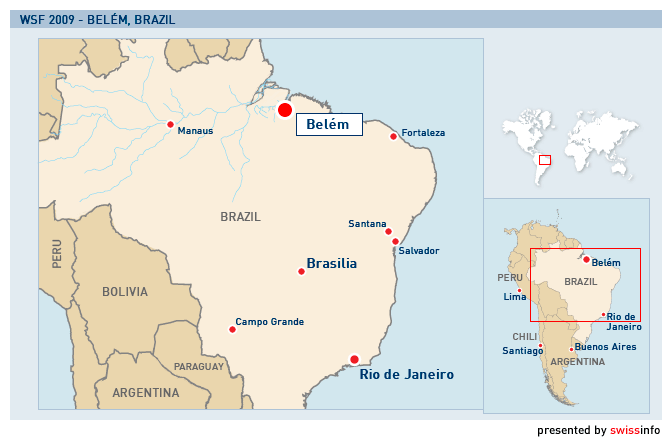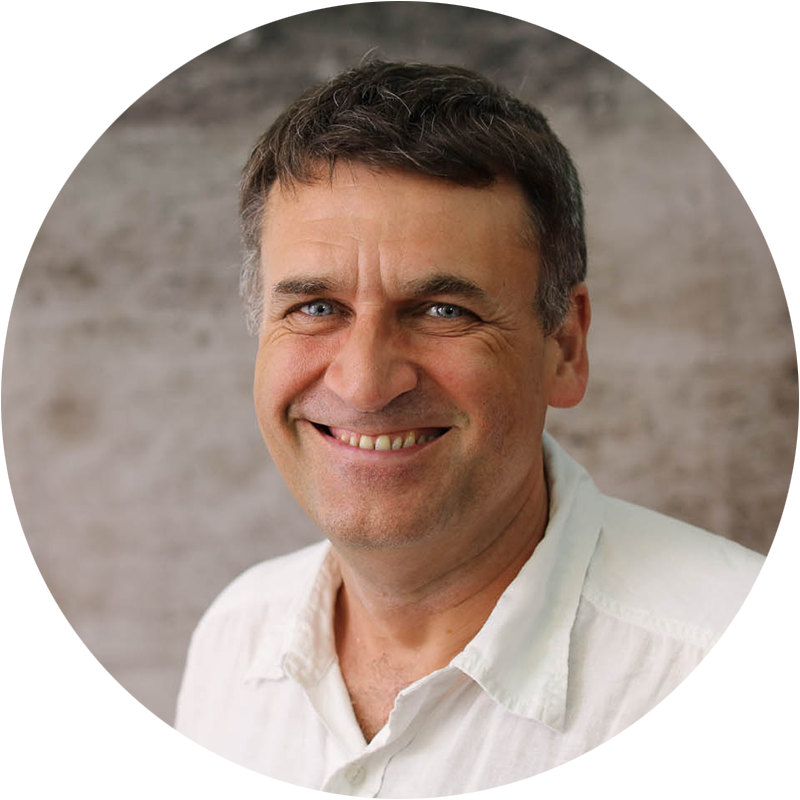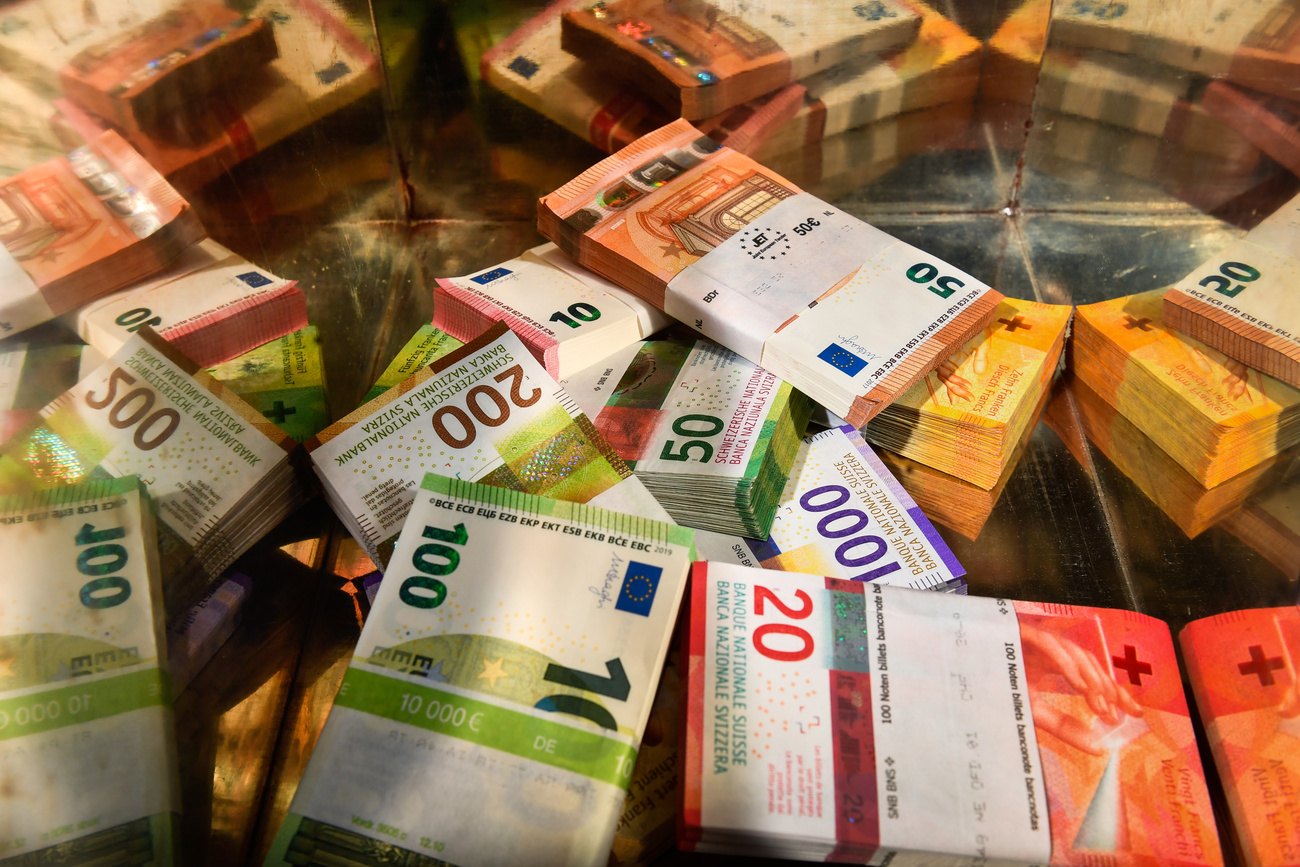Looking for a better world in the Amazon

The World Social Forum (WSF) is being held - after a year's break - in the Brazilian city of Belém on the banks of the Amazon estuary.
Billed as an alternative to the World Economic Forum meeting in the Swiss resort of Davos, the WSF, which starts on January 27, will gather anti-globalisation campaigners and non-governmental organisations from around the world including a Swiss delegation.
Belém is situated in northern Brazil. The organisers did not choose the “Cidade das Mangueiras” or city of mango trees, as it is known, for the seventh forum by chance.
Capital of the state of Parà, it is home to one million inhabitants and is one of the main entry points into the Amazon rainforest.
This overexploited area is “under constant pressure from the most savage forces of capitalism,” according to Antonio Martins, one of the forum’s founders, in a recent interview with a Geneva newspaper.
The Amazon rainforest is nevertheless fertile ground for social movements, such as the Landless Workers’ Movement (MST) or the Quilombolas Community, representing the descendents of slaves, which are both firmly rooted in the region.
Return to its origins
The return of the forum to the country where it was born – the first three events were held in Porto Alegre – will once again throw the spotlight on the anti-globalisation movement.
Around 100,000 people from 4,000 non-governmental organisations and other groups, coming from more than 150 countries are expected to attend the six-day meeting.
There have been fears that the WSF was in danger of losing its momentum after its the last meeting in 2007 in Nairobi, Kenya, which came under fire for quality of its debates and the high registration costs. However, the present economic crisis has given the forum new strength.
“This globalised system has shown everyone its limits,” said Peter Niggli, director of Alliance Sud, the Swiss Alliance of Development Organisations, and member of the Belém delegation.
“I am expecting two things from this forum: on the one hand, to know how much social movements can influence political powers in different countries, and on the other, to see which proposals are put forward to combat the crisis and to change the financial architecture.”
No miracles
For his part, the Green Party senator Luc Recordon, the only Swiss parliamentarian taking part in the delegation, is not holding his breath for any miracles.
“I don’t think that the forum will be the place for the birth of ideas, but rather the place for ideas to spread and for debate,” he told swissinfo.
“For example, you don’t see great industrial innovations at the autumn fair, but people go there to see what industry is offering.”
For social movements and NGOs, meetings such as the WSF are important because they allow representatives to keep up to date with what is going on in other parts of the world and, above all, to build up a large network of contacts.
“The forum allowed us to establish relations with union officials from other countries, especially those who deal with multinationals who have their headquarters in Switzerland,” explained Rita Schiavi, a board member of Unia, the largest trade union organization in Switzerland.
“For example, we invited union officials from Nestlé in the Philippines and managed to put them in contact with the company’s head office.”
Imagination needed
Niggli describes the WSF as a “bazaar of ideas” which allows horizons to be widened. “It’s a meeting point where you can find out about past and future campaigns,” he told swissinfo.
“It’s also a place where you can promote new activities. In the past the forum helped launch the Tax Justice Network, a global network which combats tax evasion and fiscal havens and which is having an influence on the United Nations and the Organisation for Economic Cooperation and Development.”
However, the forum has been criticised in the past for not generating enough concrete ideas, concentrating too much on local initiatives and for being limited to producing somewhat vague critiques of neo-liberal ideas.
The organisers are aware that the meeting now has to rise to the challenge of “quickly overcoming the political culture which likes to denounce it,” according to Martins.
“People need firm answers, so we’ll have to be imaginative,” he said.
swissinfo, based on an Italian article by Daniele Mariani
Around 50 people make up the Swiss delegation to the World Social Forum in Belém.
They are all members of NGOs and unions. Also participating are journalists, a member of the Swiss Agency for Development and Cooperation, one national parliamentarian (Luc Recordon) and several regional and local politicians.
The delegation will meet local Swiss aid organisations partners, politicians and Brazilian activists before the start of the forum.
The Swiss NGO E-changer is marking its 50th anniversary at the forum with a workshop on cooperation between developed and developing countries.
The WSF first took place in 2001, in the Brazilian city of Porto Alegre. It was conceived in response to the annual meeting of the World Economic Forum in Davos, which is held at the same time of year.
It has taken place three times in Porto Alegre – 2002, 2003 and 2005. In 2004 it was hosted in Mumbai in India. The sixth event was split into a series of three meetings in separate countries – Mali, Venezuela and Pakistan. 2007 was the first time the WSF was entirely held in Africa.
Local meetings were held in 2008 and 2009 marks the return of a centralised event. All the WSF meetings have the slogan “Another World is Possible”.


In compliance with the JTI standards
More: SWI swissinfo.ch certified by the Journalism Trust Initiative











You can find an overview of ongoing debates with our journalists here . Please join us!
If you want to start a conversation about a topic raised in this article or want to report factual errors, email us at english@swissinfo.ch.